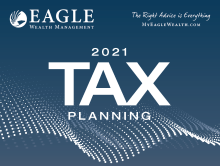Your 2021 tax planning guide inside!
Hello Eagle Wealth friends,
We've nearly made it through our first month of 2021 and to describe it as eventful is an understatement. Between constant political breaking news, vaccine updates, and recovering from the holidays - it's safe to say that everyone could probably use a calm news week. So how are you, really? Are you hanging in there? It's okay to feel overloaded and maybe even a little burnt out. We're here to help calm some of the nerves you might have. If you're feeling stressed give us a call (really, we love talking with you).
One pressure we hope to ease is the upcoming tax season. The Internal Revenue Service (IRS) announced that tax season will start a little later than usual. This year the IRS will begin accepting and processing 2020 tax returns on Friday, February 12th.1 In light of the December 27th tax law changes, which brought a second round of Economic Impact Payments and other benefits to many, the IRS will use this additional time to update, program, and test their systems.1 Even with this new date in mind, your deadline to file is still April 15th.
Last Tuesday we shared our tax season information roundup with key dates and answered your most frequently asked questions. If you missed it, check out the infographic here . This week we're excited to share our 2021 tax planning guide. Inside you'll explore where your tax dollars go, some of the ways tax filing may look different in 2021, and what you can do to prepare.
Download the 2021 Tax Planning Guide
Wishing you a peaceful week,
Your Eagle Wealth Team
|
Anticipation of a new fiscal stimulus and improved vaccine distribution powered stocks to fresh record highs last week with technology stocks leading the way. The Dow Jones Industrial Average gained 0.59%, while the Standard & Poor's 500 picked up 1.94%. The Nasdaq Composite index led, gaining 4.19% for the week. The MSCI EAFE index, which tracks developed overseas stock markets, rose by 1.15%.1,2,3 |
 |
 |
Stocks Scale New HeightsIn a holiday-shortened week, stocks rallied as investors welcomed testimony from incoming Treasury Secretary Janet Yellen to the Senate Finance Committee that suggested lawmakers needed to "act big" on fiscal stimulus, raising hopes for a new round of federal spending. An orderly presidential transition and the anticipation of a more effective vaccine distribution plan contributed to stocks touching multiple new highs last week. Investor enthusiasm was further supported by a strong start to the fourth-quarter earnings season. Mega-cap technology companies resumed their market leadership ahead of a full calendar of big tech earnings reports this week. Market momentum stalled a bit into the close on concerns that any stimulus spending bill might come in lower than expected. Earnings Beating ExpectationsOne of the concerns of market watchers has been the valuations of stocks. Stocks are currently trading at about 23 times 2021 earnings, above the historical range of 15 to 17 times forward earnings.4 This Week: Key Economic DataTuesday: Consumer Confidence. |




